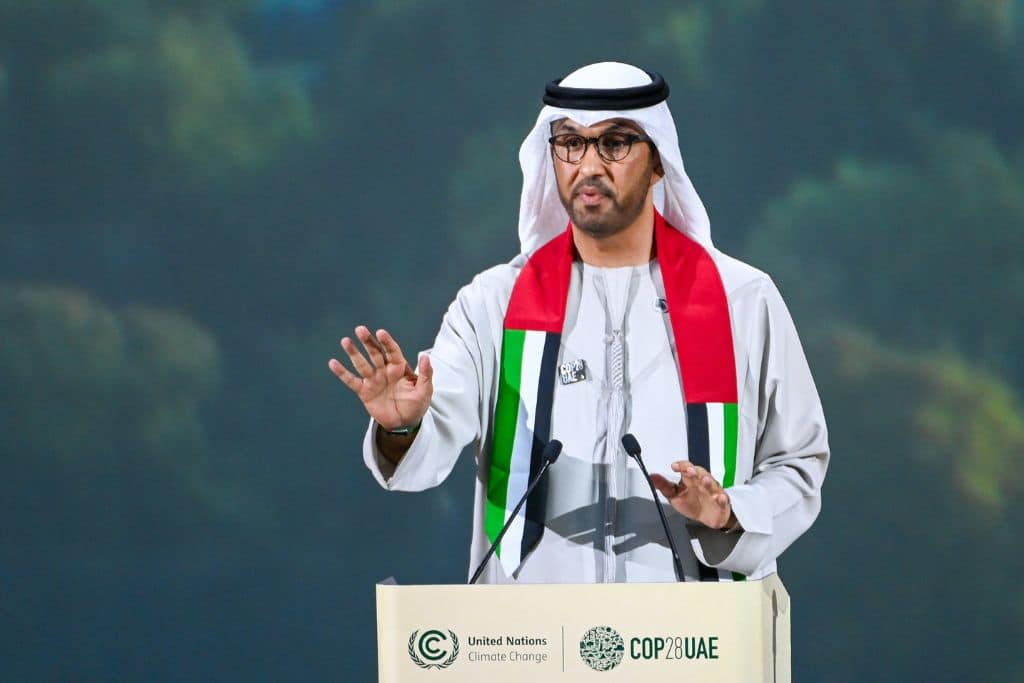It comes just days after leaked documents showed the COP28 presidency’s intentions to use the UN summit to pitch oil and gas deals.
—
COP28 president Sultan Al Jaber said in an interview last month that claims that a fossil fuel phase-out is needed to limit global warming to 1.5C are not backed by science, deepening controversy around this year’s presidency.
The comments came during an exchange with former Irish president Mary Robinson at a live online event on November 21 and were first reported by The Guardian and the Centre for Climate Reporting (CCR).
Speaking at the event, Robinson – who is the chair of the Elders group, an international non-governmental organisation of public figures noted as senior statesmen, peace activists, and human rights advocate – told Al Jaber that his involvement in the oil industry should give him the “credibility” necessary to push for a fossil fuel phase-out deal at COP28.
“I’m not in any way signing up to any discussion that is alarmist. There is no science out there, or no scenario out there, that says that the phase-out of fossil fuel is what’s going to achieve 1.5C,” Al Jaber, who is the head of state oil giant Abu Dhabi National Oil Company (Adnoc), fired back.
“Please help me, show me the roadmap for a phase-out of fossil fuel that will allow for sustainable socioeconomic development, unless you want to take the world back into caves,” he added after Robinson suggested Adnoc is set to increase investments in fossil fuels in the coming years.
On Sunday, a COP28 spokesperson questioned about the matter said the story was “just another attempt to undermine the presidency’s agenda, which has been clear and transparent and backed by tangible achievements.”
“[Al Jaber] has repeatedly communicated our position on fossil fuels and invited all parties to work together and come up with solutions that can achieve alignment, common ground and consensus,” the spokesperson said.
Speaking at a climate summit in Germany earlier this year, Al Jaber emphasised the need to phase out fossil fuel emissions, rather than production, by focussing on the development of new emission reduction technologies.
“In a pragmatic, just and well-managed energy transition, we must be laser-focused on phasing out fossil fuel emissions, while phasing up viable, affordable zero-carbon alternatives,” he said, adding that the United Arab Emirates (UAE), this year’s COP host, “will encourage smart government regulation to jump-start the hydrogen value chain and make carbon capture commercially viable.”
Al Jaber’s appointment and the decision to host COP28 in the oil-rich UAE have drawn criticism from the beginning.
In the run-up to COP28, which kicked off in Dubai last week, the UAE issued a third update of its National Determined Contributions (NDCs), setting a target of reducing emissions by 40% by the end of the decade, up 9% from the previous target. The efforts outlined in the new climate plan, however, were hailed “insufficient” by many. In a report issued in July, non-profit Climate Action Tracker (CAT) said CO2 emissions are expected to increase through to 2030 as the country plans to further increase fossil fuel production and consumption, at odds with the urgent decrease needed to curb global warming.
The UAE-backed Oil and Gas Decarbonization Charter announced by Al Jaber at COP28 on Saturday has also sparked backlash. 50 top fossil fuel companies – including ExxonMobil and state energy companies Saudi Aramco and Adnoc – pledging to set targets to cut emissions from their own operations, though none pledged to cut production. While the targets are not legally binding, signatories – which together account for about one-third of global oil and gas production – have to submit a plan to meet them by 2025.
UN-Secretary General António Guterres criticised Al Jaber’s plans, saying they “clearly fall short of what is required.” Former US Vice President and climate advocate Al Gore also voiced criticism, saying the UAE’s position as supervisor of climate talks was an abuse of public trust. “They are abusing the public’s trust by naming the CEO of one of the largest and least responsible oil companies in the world as head of the COP,” he said.
The report comes just days after an investigation by the CCR and the BBC revealed that the COP28 presidency was planning to use meetings with foreign countries to push for oil and gas deals. Despite al Jaber repeatedly denying his involvement, leaked documents show that fossil fuels were among the talking points in meetings between UAE energy company and 15 nations ahead of the summit.
Featured image: COP28. Photo: UNclimatechange/Flickr
You might also like: COP28 Sponsors Failed to Commit to UN-Backed Net-Zero Targets, Analysis Finds


















